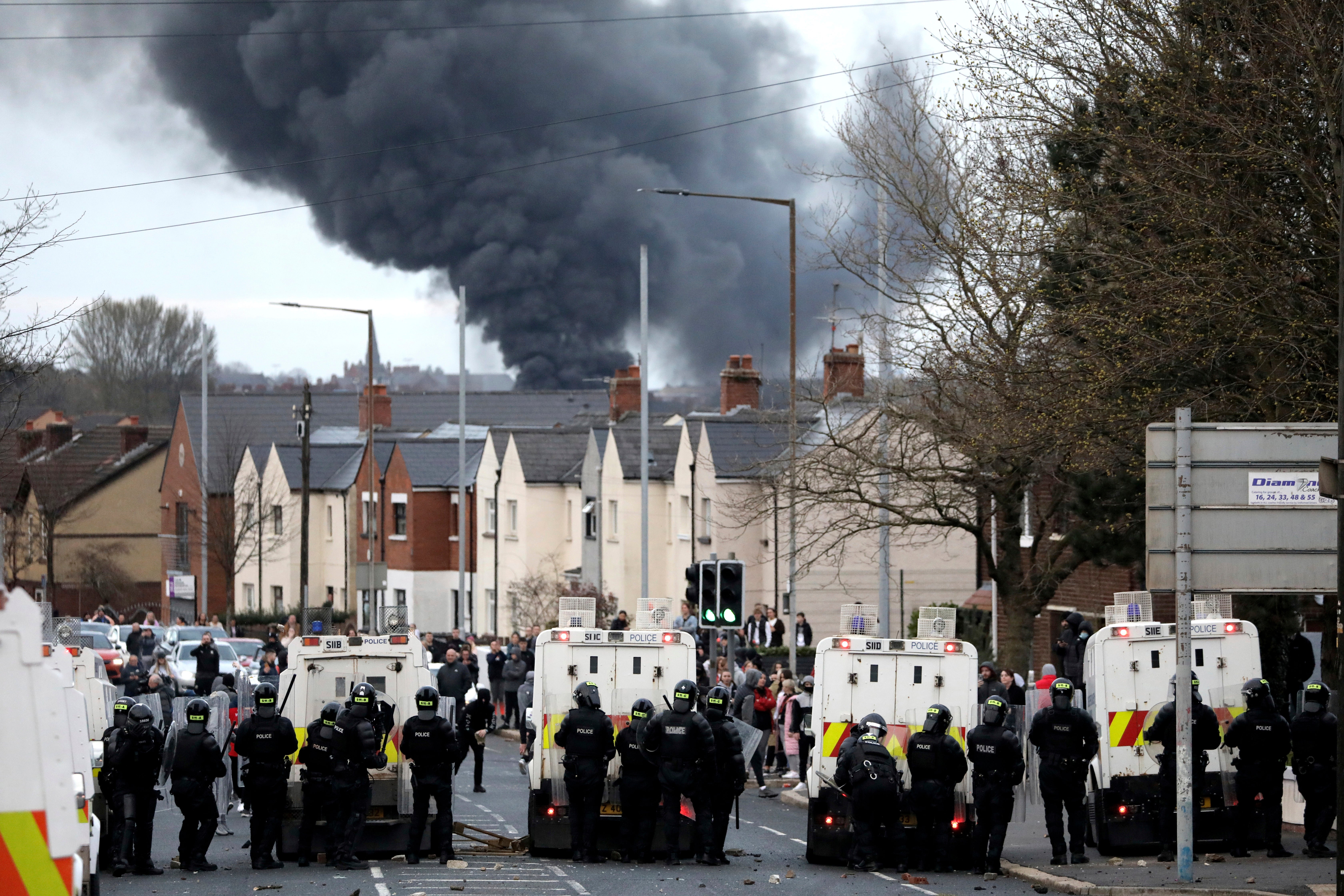Police in Northern Ireland warn of possible attacks on officers on Easter Monday
DUP leader denies lack of governance at Stormont is increasing threat of violence, as police adopt tactics not seen in years amid ‘exceptional circumstances’

Police in Northern Ireland have warned of “strong intelligence” that dissidents are planning to launch terror attacks against officers on Easter Monday.
Officers will adopt a policing strategy not seen in years to counter the threat, reflecting the “exceptional circumstances” ahead of the Easter weekend, said Chief Constable Simon Byrne of the Police Service of Northern Ireland (PSNI).
Easter Monday not only marks the 25th anniversary of the Good Friday Agreement – with US president Joe Biden set to visit on Tuesday – but is also the day on which dissident republicans traditionally mark the anniversary of the Easter Rising rebellion against British rule in 1916, with a parade set to take place in Derry.
Assistant Chief Constable Bobby Singleton expressed concern that dissidents could use public disorder as a platform to launch attacks, saying: “We don’t have to go too far back, sadly, to see precisely that kind of scenario playing out in Derry/Londonderry in the past.”
With Brexit tensions having resulted in the absence of an assembly at Stormont since February, DUP leader Sir Jeffrey Donaldson was forced to deny that the lack of government had heightened the threat of violence – after MI5 raised the threat level back to “severe” just days ago.
“While Stormont was sitting for many years, these dissident republicans engaged in violence, they murdered police officers,” Sir Jeffrey told BBC Radio 4. “I remember, during one sitting of the assembly, they murdered two soldiers in Co Antrim as they were preparing for deployment to Afghanistan.
“Of course we want to see Stormont fully functioning, but the idea that, when we get Stormont back up and running, that dissident republicans will put their guns away – I didn’t hear the chief constable suggest that. The idea that evil men and women who go out to commit murder react to political circumstances simply doesn’t stack up.”
The DUP has withdrawn its support for Stormont’s power-sharing institutions as part of its protest against post-Brexit trading arrangements, which prime minister Rishi Sunak and EU chief Ursula von der Leyen sought to address with the Windsor Framework. The framework was given a lukewarm reception by the DUP.

Sir Jeffrey said that, within the next few days, his party would consider a report prepared by a consultative panel he established to look at the implications of the framework.
But former Sinn Fein leader Gerry Adams argued that the DUP should be given “a limited amount of time” to make a decision on the framework, and that the British and Irish governments should step in if the party does not return to power-sharing.
Speaking to RTE, Mr Adams said the Good Friday Agreement provided for a British and Irish intergovernmental conference, adding: “It’s rarely been called – the Irish government have not been proactive on it. It deals with non-devolved matters, issues pertinent to our current situation.”
The decision by MI5 to raise the threat level last month, meaning an attack is “highly likely”, came after a gun attack in Co Tyrone – which police have blamed on the New IRA – left senior detective John Caldwell with life-changing injuries.
While insisting that police will be “ready for whatever will happen in Derry/Londonderry on Monday”, Assistant Chief Constable Singleton warned that the PSNI is “in the mouth of a period of really unprecedented demand” – and an “absolutely stark” potential funding gap of £150m over the next year.
He added that, in order to “create the operational footprint to allow us to be able to deliver safe events over this next week to 10 days”, the PSNI had activated Operation Inspire, putting a large number of frontline police officers onto 12-hour shifts, thereby boosting the force’s public visibility.
“This is the first time in a number of years we have had to activate this plan,” said Chief Constable Byrne. “It is a reflection of the quite difficult and exceptional circumstances we find ourselves in.”
However, their colleague, Assistant Chief Constable Chris Todd, said that there was no specific intelligence that the anniversary of the Good Friday Agreement was acting as an additional motivation for dissident republicans to launch attacks, adding: “We plan for the worst and we hope for the best.”
The PSNI has asked for 330 officers from different parts of the UK to assist with the massive security operation that will take place during the visit by Mr Biden, who is himself of Irish heritage and has previously made clear his determination that the Good Friday Agreement be protected during Brexit negotiations.
Speaking in Belfast on Thursday, Ireland’s deputy prime minister Micheal Martin said the possibility of an attack on police represented “criminality in its worst form”, adding: “I think it’s very evil people who are contemplating this.”
The partner of murdered journalist Lyra McKee, Sara Canning, was reported by the BBC as saying that her “heart sinks” but she is not surprised when she hears of potential violence linked to dissident republicans over the Easter period.
“These people need to realise that their time is gone, the support for them is not there any more,” she said. “The vast majority of people here are not interested in violence, we are not interested in going back to the past, we want to move forward and we want our kids to have a better life than we did.”
Join our commenting forum
Join thought-provoking conversations, follow other Independent readers and see their replies
Comments



Bookmark popover
Removed from bookmarks